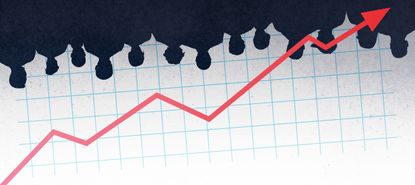The booming stock market shows America is diseased
This bull market is built on sand


One of the more peculiar tics in mainstream media is treating the stock market as a sort of general barometer of economic health. If it's going up, then things are assumed to be going well — and if it falls a lot, then it's time to worry. Thus conservatives have been celebrating the astounding stock rally of the Trump era, which has been more than twice as strong as the average since 1928 for presidents at this point in their term.
To be sure, a stock market crash can have serious negative repercussions. But the booming market is also evidence of a deeply sick economy — one geared to funnel money to the very tippy-top of the wealth distribution, and which is seriously vulnerable to another devastating financial crisis.
The first thing to know about stocks is that a huge fraction of the population owns no stock at all, and only the rich own them in significant quantities. A Gallup poll found that 55 percent of people own any stock — a majority, but most of them own only small amounts. If we break the population into 10 groups (or deciles) based on how much stock they own, as Matt Bruenig does with the Survey of Consumer Finances of 2013, we find that the top decile accounts for 86.8 percent of all stocks. The next decile owns 9.5 percent, the third 2.8 percent, and the rest little or nothing.
Subscribe to The Week
Escape your echo chamber. Get the facts behind the news, plus analysis from multiple perspectives.

Sign up for The Week's Free Newsletters
From our morning news briefing to a weekly Good News Newsletter, get the best of The Week delivered directly to your inbox.
From our morning news briefing to a weekly Good News Newsletter, get the best of The Week delivered directly to your inbox.
In other words, the richest 10 percent of Americans own a giant super-majority of the stock market. The rest have scraps, if they have anything. This surely is mainly down to the fact that most people do not have lots of disposable income to play the ponies, er, I mean, wisely invest for the future. So a booming stock market in the first instance mainly benefits people who don't need the help. But that's just the start of the problems.
Think about a stock — it's merely a piece of distributed ownership in a public corporation, something which is chartered and regulated by the state. The justification for the corporate legal form (including valuable protections like limited liability) is that corporations are supposed to be broadly beneficial, an entity which creates benefits for owners who get profits, the workers who get jobs and wages, and customers who get goods or services.
Stock markets, meanwhile, are supposed to "intermediate" between savers and borrowers — channeling investment to the best performing and most promising companies. But as Doug Henwood writes in his book Wall Street, it does not work like this at all. In reality, the stock market is a political-economic control mechanism. As Matt Stoller writes in his book Goliath, Wall Street raiders have continually pressured well-run corporations with low debt, high investment budgets, or high wages to cut costs and vomit forth profits for shareholders through dividends and share buybacks. Indeed, by buying a controlling share of stock with borrowed money, hostile takeover specialists can put the debt on the company's own books — thus effectively buying the company with its own assets and money.
Now, it wasn't always this way. In the post-Second World War generation, there were strong unions at most big corporations, which could protest or strike to defend their share of the corporate surplus. High top tax rates also made it less fruitful to try to grab down as much income as possible. But those days are long gone now. The fraction of GDP going to labor has fallen sharply since the 1980s, while the fraction going to corporate profits has increased sharply, and the share of income and wealth taken up by the very rich has skyrocketed.
Sign up for Today's Best Articles in your inbox
A free daily email with the biggest news stories of the day – and the best features from TheWeek.com
This brings us to the deeper problem with an economy geared above all to goose stock prices. The broader economy, including all these public corporations, is still based on mass production and consumption. It follows that as inequality grows, the economy will sag and slow, because rich people disproportionately save their income rather than spend it, usually by buying financial assets like stocks. So as the financial markets are swamped by a tidal wave of profits, those stocks in turn become ever-more divorced from the health of the underlying corporate enterprise. The result is a marked tendency towards financial bubbles, as oceans of money slosh here and there looking for safe returns that can't exist because the mass public has little disposable income which would justify fresh investment in real enterprises.
This is exactly the background which made the Great Depression of the 1930s and the Great Recession after 2008 so bad. The economy was fundamentally unsound, and it took only the kick of a financial panic to knock it over. As Chester Bowles, who ran the price control board during the Second World War, once wrote:
If ever it has been demonstrated that prosperity cannot continue unless enough income is being distributed to all of us — farmers and workers as well as businessmen — to buy the increasing products of our increasingly efficient system, it was demonstrated in the twenties. If we need any demonstration of the fact that our economy can choke itself to death on too many profits, the twenties provide that demonstration. [Tomorrow Without Fear]
The stock market is surging under Trump largely because of the massive tax cuts for corporations and the rich that Republicans passed in 2017. Contrary to their promises, corporations spent most of the windfall not on investment, but on dividends and share buybacks which fueled gains in the market. Wages, meanwhile, are up slightly, but not anywhere nearly as much as stocks. Overall growth is also weak. This means the stock boom is built on sand — especially given how the Trump administration has dismantled much of the post-2008 financial regulation. I hope the top decile is enjoying themselves, because the good times can't last forever.
Want more essential commentary and analysis like this delivered straight to your inbox? Sign up for The Week's "Today's best articles" newsletter here.
Create an account with the same email registered to your subscription to unlock access.
Ryan Cooper is a national correspondent at TheWeek.com. His work has appeared in the Washington Monthly, The New Republic, and the Washington Post.
-
 Arizona court reinstates 1864 abortion ban
Arizona court reinstates 1864 abortion banSpeed Read The law makes all abortions illegal in the state except to save the mother's life
By Rafi Schwartz, The Week US Published
-
 Trump, billions richer, is selling Bibles
Trump, billions richer, is selling BiblesSpeed Read The former president is hawking a $60 "God Bless the USA Bible"
By Peter Weber, The Week US Published
-
 The debate about Biden's age and mental fitness
The debate about Biden's age and mental fitnessIn Depth Some critics argue Biden is too old to run again. Does the argument have merit?
By Grayson Quay Published
-
 How would a second Trump presidency affect Britain?
How would a second Trump presidency affect Britain?Today's Big Question Re-election of Republican frontrunner could threaten UK security, warns former head of secret service
By Harriet Marsden, The Week UK Published
-
 'Rwanda plan is less a deterrent and more a bluff'
'Rwanda plan is less a deterrent and more a bluff'Instant Opinion Opinion, comment and editorials of the day
By The Week UK Published
-
 Henry Kissinger dies aged 100: a complicated legacy?
Henry Kissinger dies aged 100: a complicated legacy?Talking Point Top US diplomat and Nobel Peace Prize winner remembered as both foreign policy genius and war criminal
By Harriet Marsden, The Week UK Last updated
-
 Trump’s rhetoric: a shift to 'straight-up Nazi talk'
Trump’s rhetoric: a shift to 'straight-up Nazi talk'Why everyone's talking about Would-be president's sinister language is backed by an incendiary policy agenda, say commentators
By The Week UK Published
-
 More covfefe: is the world ready for a second Donald Trump presidency?
More covfefe: is the world ready for a second Donald Trump presidency?Today's Big Question Republican's re-election would be a 'nightmare' scenario for Europe, Ukraine and the West
By Sorcha Bradley, The Week UK Published


